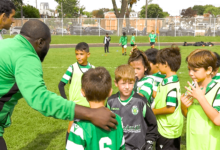“Dogs don’t judge”
Therapeutic Paws of Canada (TPOC) is a national Non-Profit volunteer organization providing dog and cat visitation resources for human need, such as physical, mental, educational, motivational, and/or socialization. The organization provides regular visits to hospitals, senior residences and schools and exists since 2002.

We know that, thousands of years ago, our ancestors likely kept some wolves around. They may have captured them young, domesticated them and found that they were useful for hunting. Gradually they became tamer companions and evolved into dogs. This could have been as early as 27,000 years ago. Ever since, humans have had dogs around, and keeping a pet has become a common part of many cultures.
TPOC believes that dogs can help patients to recover from a surgery or kids to improve their reading. Kimberly Hunter works on TPOC has a team leader.
Milénio Stadium: What is TPOC, who works here and how does it survive?
Kimberly Hunter: TPOC has a mission to provide caring and supportive visits and interaction with certified therapy teams consisting of a volunteer and their therapy dog/cat. TPOC partners with a variety of institutions in the community to provide the services of our volunteers wherever there is a need. Our certified therapy teams may visit hospitals, retirement residences and long-term care facilities, adult day centres, community living centres, women’s shelters, universities and colleges. Our child certified teams may also visit these facilities with the addition of schools, libraries and children’s centres including hospitals and care facilities.
Our objectives are: provide a professional and robust organization to support our mission; provide a high standard of evaluation and guidance to our teams to ensure they are provided with clear and consistent guidelines for visiting; ensure our clients receive the best possible experience when visited by our teams; conduct all visits in a safe and positive manner. TPOC is a non-profit organization – we depend on donations and sponsorship. There’s no fee for any TPOC programs, none of our members, team leaders or board of directors receive any form of compensation.
MS: Is there any volunteer guideline that we must follow to be enrolled with TPOC?
KH: We do not train dogs or people, but we do evaluate our prospective teams to ensure their ability to do well in therapy work. Our handlers are all carefully screened volunteers who work with their own family pet to provide therapy visits. They have a set of rules to follow for both themselves and their dog. They must also provide a current police records check.
MS: What does a Team Leader do?
KH: A Team Leader is responsible to receive and respond to all inquiries from public facilities to new candidate inquiries. They set up visiting programs in schools, libraries, hospitals, LTC facilities and handle all of the insurance requirements. They set up evaluations, complete the onboarding process for new candidates and place them in compatible facilities. They organize fundraising events, etc.
MS: TPOC works with dogs and cats. Is dog therapy different from cat therapy?
KH: No, they both do the same.
MS: What are the main benefits of animal therapy?
KH: Our dedicated volunteers help make life better for seniors with regular pet visits. The medical establishment recognizes the benefits of therapy dog and cat programs. Connections with pets help to calm agitated residents and stimulates wonderful conversations.
Recovery from surgery is accelerated when there is continued contact with a pet. The positive impact of our program on the day-to-day life of seniors in our community cannot be calculated.
Many of our teams provide support to special needs classrooms in both elementary and secondary school. The tasks they perform vary greatly depending on the needs of the individual students however the underlying principle continues to be the presence of the pets improving the quality of life for students and staff alike.
Although PAWS Rooms are more often held in Universities and Colleges, our Child Certified teams may visit Secondary Schools to provide stress-reducing visits and a way to refocus around exam time.
Paws To Read ® matches child certified therapy dogs and handlers with children who struggle to read.
Kids read to the dogs and are encouraged to pick books they think the dog would like to hear. Our dogs provide undivided attention to the kids as they read aloud.
Studies have shown that reading to dogs encourages confidence and boosts self-esteem in children who struggle to read aloud in class, therefore boosting their literacy.
As you can see our programs are all proven to help people feel better. Dogs don’t judge, they love and care unconditionally.
MS: TPOC has two types of programs, seniors and child programs. How do they work, anyone can apply, in which areas we can find them, outside of Toronto, etc?
KH: Volunteers (handlers) and dogs are evaluated, if they pass, they proceed to visit seniors in long-term care facilities, hospital, etc. They must visit for six months with adults and seniors. At which point they can complete a second evaluation with their dog or cat and if they pass, they can then visit with kids, Sick Kids Hospital, Ronald McDonald House, schools, reading programs.
MS: Who trains the animals and what kind of train do they get?
KH: We do not train. All candidates are personal pets. We evaluate them based on their temperament. Social skills, calm demeanor, etc. My dog and I started by accident: I had a very close friend in palliative care at Sunnybrook Hospital, my dog and I was there every day. Nurses started asking if I could take my dog to see their patients. I was then introduced to Therapeutic Paws of Canada, I went through the evaluation, visiting at long term care home in Etobicoke. The following year we passed the evaluation to visit with children.
MS: How many people do you help every year and how many people did you helped since 2002, when TPOC was created?
KH: They started with six members – the founding member was Jay Sauvé, today she is the chairperson of the board of directors. I’m sure over all the years we have touched a million people, patients, children, families, nurses, doctors. All our special visits that we do every year.
Joana Leal/MS








Redes Sociais - Comentários